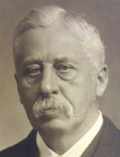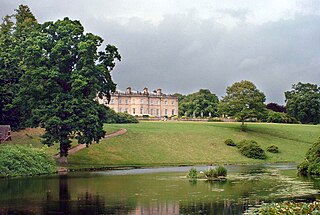Baron Gainford, of Headlam in the County Palatine of Durham, is a title in the Peerage of the United Kingdom. It was created on 3 January 1917 for the Liberal politician Jack Pease, a member of the Darlington Pease family. He notably served as President of the Board of Education from 1911 to 1915. Pease was the second son of Sir Joseph Pease, 1st Baronet, and the grandson of Joseph Pease, while Arthur Pease was his uncle and Sir Arthur Pease, 1st Baronet, Beaumont Pease, 1st Baron Wardington, and Herbert Pease, 1st Baron Daryngton, were his first cousins. The third baron was a former member of the London County Council and of the Greater London Council. As of 2013 the title is held by his younger brother, the fourth baron, an architect and town planner; County Planning Officer for Ross and Cromarty 1967–1975 and Scottish Office Inquiry Reporter 1978–1993.

Baron Rothschild, of Tring in the County of Hertfordshire, is a title in the Peerage of the United Kingdom. It was created in 1885 for Sir Nathan Rothschild, 2nd Baronet, a member of the Rothschild banking family. He was the first Jewish member of the House of Lords not to have previously converted to Christianity. The current holder of the title is Jacob Rothschild, 4th Baron Rothschild, who inherited the barony in 1990.

There have been two baronetcies created for persons with the surname Arthur, both in the Baronetage of the United Kingdom. As of 2014 both creations are extant.

Sir Joseph Wesley Flavelle, 1st Baronet was a Canadian businessman.

There have been four baronetcies created for persons with the surname Rose, all in the Baronetage of the United Kingdom. Three of the creations are extant as of 2010.

There have been two baronetcies created for members of the Pease family, both in the Baronetage of the United Kingdom. Both titles are extant.
The Nall Baronetcy, of Hoveringham Hall in the County of Nottingham, is a title in the Baronetage of the United Kingdom. It was created on 25 January 1954 for Joseph Nall, who had earlier represented Hulme in the House of Commons as a Conservative. The title is held by his grandson Edward William Joseph, who succeeded his father in 2001. He married (2004) Helen Fiona; they have one daughter Georgina Philippa Louise.
There have been five baronetcies created for persons with the surname Hill, one in the Baronetage of Nova Scotia, one in the Baronetage of Great Britain, one in the Baronetage of Ireland and two in the Baronetage of the United Kingdom. Three of the creations are extant as of 2008.

There have been four baronetcies created for persons with the surname Miller, two in the Baronetage of England, one in the Baronetage of Great Britain and one in the Baronetage of the United Kingdom. Two of the creations are extant as of 2008.
There have been four baronetcies created for persons with the surname FitzGerald, one in the Baronetage of Ireland and three in the Baronetage of the United Kingdom.
The Milburn Baronetcy, of Guyzance in the Parish of Shilbottle in the County of Northumberland, is a title in the Baronetage of the United Kingdom. It was created on 30 December 1905 for John Milburn. He was high sheriff of Northumberland in 1905. The Milburn family had made their fortune in shipping and coal. The third Baronet served as High Sheriff of Northumberland in 1928.
The Imbert-Terry Baronetcy, of Strete Ralegh in Whimple in the County of Devon, is a title in the Baronetage of the United Kingdom. It was created on 2 July 1917 for Henry Imbert-Terry. He was Chairman of the Central Organization Committee of the Conservative and Unionist Party from 1907 to 1917.
There have been two baronetcies created for persons with the surname Dunlop, with both in the Baronetage of the United Kingdom. One creation is extant as of 2007.

The Renals Baronetcy, of the City of London, is a title in the Baronetage of the United Kingdom. It was created on 4 September 1895 for Joseph Renals. He was a partner in the firm of Renals & Co, merchants, and served as Lord Mayor of London from 1894 to 1895.
The Spearman Baronetcy, of Hanwell in the County of Middlesex, is a title in the Baronetage of the United Kingdom. It was created on 28 April 1840 for Alexander Spearman, who was Comptroller General of the Exchequer and Secretary to the Commissioners for the Reduction of the National Debt for many years. The second Baronet was High Sheriff of Glamorganshire for 1882. Sir Alexander Spearman, son of Commander Alexander Young Crawshay Mainwaring Spearman (1862–1915), half-brother of the second Baronet, was a Conservative politician: his grandson Alexander Spearman married Brazilian Princess Amelia of Orléans-Braganza, daughter of Prince Antônio of Orléans-Braganza, descendants of the former Brazilian imperial family.
The Nicolson baronets refer to one of four baronetcies created for persons with the surname Nicolson, all in the Baronetage of Nova Scotia. Two of the creations remain extant as of 2008.
Sir Joseph Ellsworth Flavelle, 2nd Baronet, was the Chairman of the Canadian Palestine Committee and the World Committee on Palestine.
Flavelle is a surname. Notable people with the surname include:
Joseph Flavelle was a Canadian businessman.

Canadian peers and baronets exist in both the peerage of France recognized by the Monarch of Canada and the peerage of the United Kingdom.








